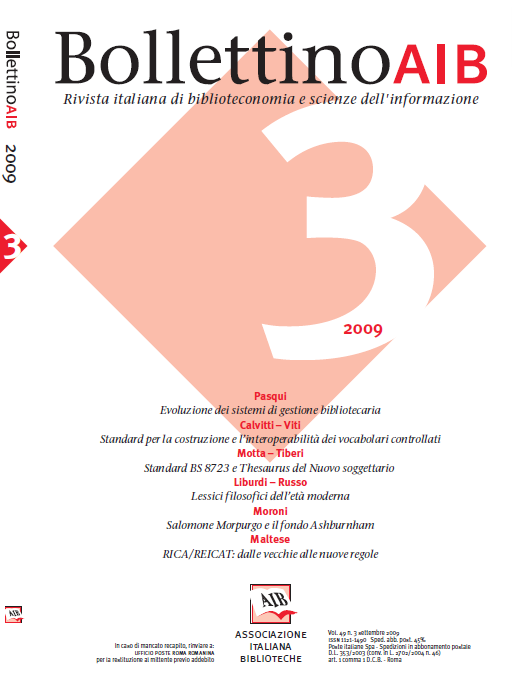Repercussions of the British standard BS 8723 on the Thesaurus of the Nuovo soggettario
Main Article Content
Abstract
Almost three years since the publication of the Nuovo soggettario and the prototype of the Thesaurus, much has been done towards developing the project from its prototype phase to an actual operational stage. Although still a tool in constant evolution, the Nuovo soggettario has now become an indexing system to all intents and purposes. Developments of information sciences and of the web, and the deeply changed scenario of the last twenty years, are reflected in the topics most emphasized in the recent British standard on controlled vocabularies, the BS 8723 published between 2005 and 2008, such as the interoperability between vocabularies, mapping between thesaurui and other types of controlled vocabularies, multilinguism, criteria of facet analysis.
These topics are all dealt with, moreover, with a similar emphasis in the American standard ANSI/NISO Z39.19-2005 that was published at the same time. This demonstrates that the debate on practical construction of controlled vocabularies, on the theoretical implications that these entail, and on their concrete use by users, takes place in a prevailingly computerized context, but it also shows that, both for reasons of economic optimization, and for promoting better information retrieval within the WEB, it is absolutely necessary to develop systems of dialogue and integration between various tools.
Its observance of international principles and rules, adjusting to standards, the possibility of its contribution to multilingual authority files; shows how the Nuovo soggettario is inserted in a context that can be extensively referred to. Italy has created a library tool with characteristics that are in line with what has been focalized by international debate on the necessity to revise the information needs of users in the light of the great changes of the digital age. The BS 8723 and the Thesaurus of the Nuovo soggettario are developed in the knowledge that the user, even if not an expert, should have the main role in the use of these tools. In spite of the competition offered by Internet and full text research, semantic access supported by controlled vocabularies constructed on the basis of shared rules and able to interoperate, so creating new contexts, offers an effective resource for information retrieval. As we already said, this potential is obviously strongly linked to the development and effectivenes of interoperable systems that, more than any other factor, can guarantee sharing of contents and dialogue. Our contribution aims at clarifying the repercussions that the British standard has had in the choices of the Thesaurus of the Nuovo soggettario and also at highlighting how the same problems were also dealt with by the American ANSI/NISO Z39.19.
These topics are all dealt with, moreover, with a similar emphasis in the American standard ANSI/NISO Z39.19-2005 that was published at the same time. This demonstrates that the debate on practical construction of controlled vocabularies, on the theoretical implications that these entail, and on their concrete use by users, takes place in a prevailingly computerized context, but it also shows that, both for reasons of economic optimization, and for promoting better information retrieval within the WEB, it is absolutely necessary to develop systems of dialogue and integration between various tools.
Its observance of international principles and rules, adjusting to standards, the possibility of its contribution to multilingual authority files; shows how the Nuovo soggettario is inserted in a context that can be extensively referred to. Italy has created a library tool with characteristics that are in line with what has been focalized by international debate on the necessity to revise the information needs of users in the light of the great changes of the digital age. The BS 8723 and the Thesaurus of the Nuovo soggettario are developed in the knowledge that the user, even if not an expert, should have the main role in the use of these tools. In spite of the competition offered by Internet and full text research, semantic access supported by controlled vocabularies constructed on the basis of shared rules and able to interoperate, so creating new contexts, offers an effective resource for information retrieval. As we already said, this potential is obviously strongly linked to the development and effectivenes of interoperable systems that, more than any other factor, can guarantee sharing of contents and dialogue. Our contribution aims at clarifying the repercussions that the British standard has had in the choices of the Thesaurus of the Nuovo soggettario and also at highlighting how the same problems were also dealt with by the American ANSI/NISO Z39.19.
Article Details
Section
Articles

This work is licensed under a Creative Commons Attribution-ShareAlike 4.0 International License.
